Why chickens stop laying eggs
Raising backyard chickens is a great way to have a daily supply of farm-fresh eggs right outside your kitchen door. But what if the eggs stop coming? If you are in an egg drought, we will look at the top reasons why chickens stop laying eggs so you can see what the issue is and what you can do to help.
Tips and resources for Raising Chickens that are healthy, happy, and consistently lay eggs all year long.
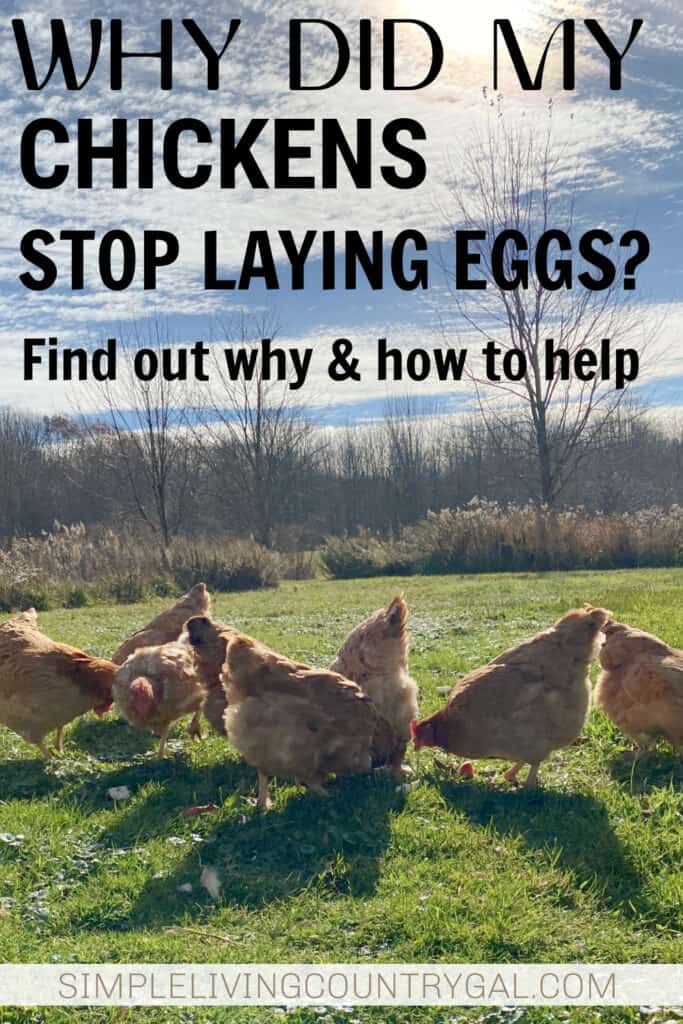
There are few things more disappointing for a backyard chicken owner than opening up the coop in the morning and finding no eggs. After all, one of the main reasons for raising chickens is to have a daily supply of fresh eggs right outside your kitchen door. So, why do chickens sometimes stop laying eggs? Many reasons are natural and will happen here and their during a hen’s life.
Other reasons can be a cause for concern, meaning you will want to step in and provide support or make changes to help. We will explore some of the top reasons hens may stop laying and provide tips on keeping your chickens healthy, happy, and consistently producing eggs all year round.
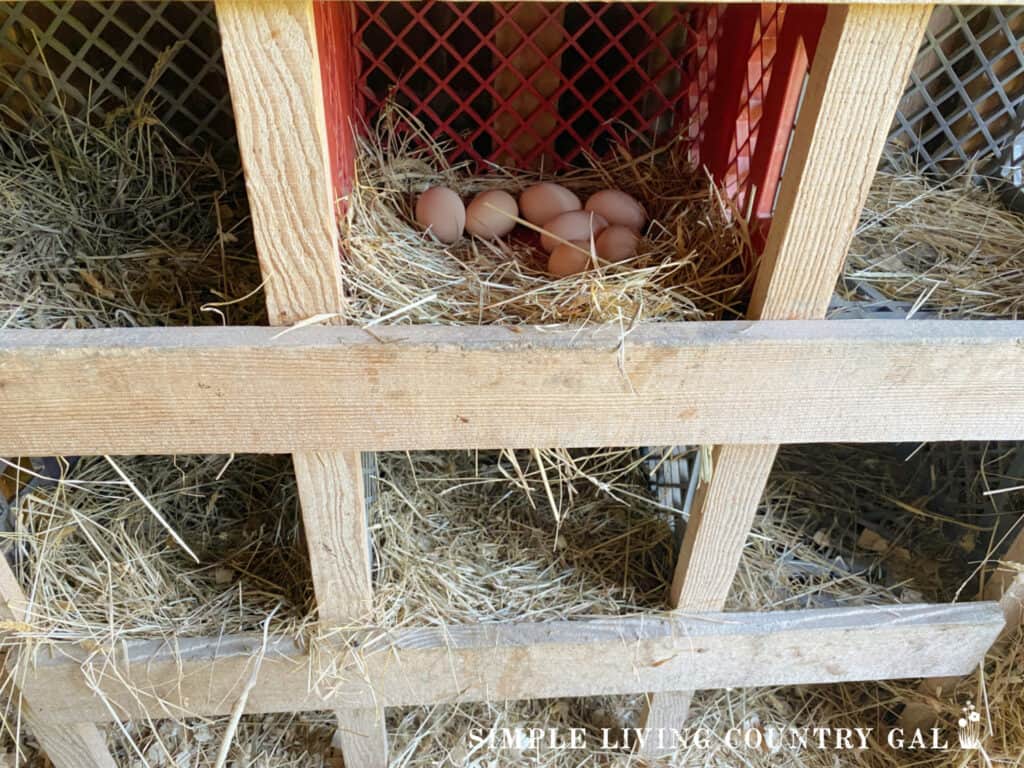
When do chickens start laying eggs?
Before we dive into the reasons why chickens may stop laying eggs, let’s first understand when they start laying in the first place. Chickens typically reach sexual maturity and begin to lay eggs at around 6 months of age. This can vary depending on factors such as breed and environment, but you can expect your hens to start producing eggs around this time.
As they continue to mature, their egg production will increase and peak at around 1-2 years of age. After that, it will gradually decline over time until the hen reaches the end of her laying cycle.
How long do chickens lay eggs?
On average, chickens will lay eggs for about 2-3 years before their egg production slows down significantly. Some breeds may continue to lay consistently for longer periods, while others may stop laying altogether after a few years. It’s important to keep this in mind when deciding on the age of your flock and whether to introduce new hens for continued egg production.
Reasons why chickens may stop laying eggs
Now let’s take a closer look at some of the top reasons why your hens may slow down or stop laying eggs.
Reason #1. Chicken Molting
Molting in chickens is a natural process where they shed their old feathers and grow new ones. During this time, they may stop laying eggs as their body focuses on growing new feathers instead of producing eggs. Molting usually happens in the fall or winter months and can last for several weeks to a few months.
How to Help:
- Be sure you are feeding a high-quality feed.
- Add more bedding to keep molting chickens warm.
Read: What is molt in chickens and how can you help?
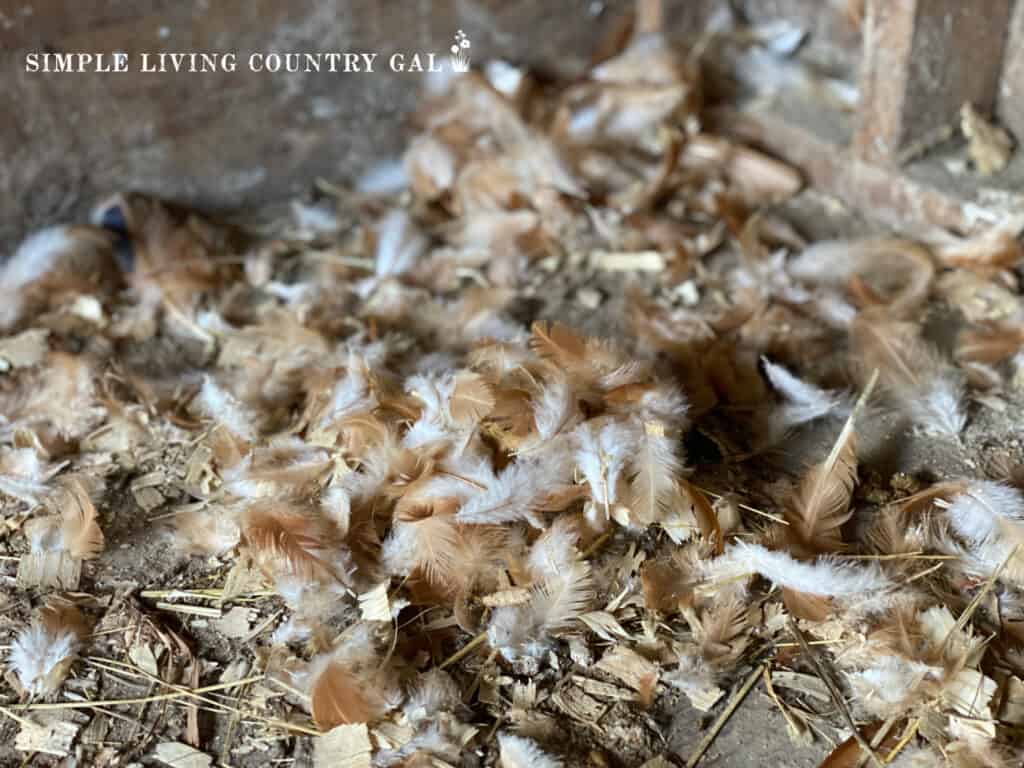
Reason #2. Lack of daylight
Chickens rely on daylight to regulate their reproductive hormones and stimulate egg production. As the days get shorter, hens may slow down or stop laying eggs until the daylight hours increase again.
Reason #3. Stress in the Flock
Chickens can become stressed for various reasons such as changes in environment or flock dynamics, predator attacks, or illness. When they are under stress, chickens may not have enough energy to produce eggs.
How to Help:
- Watch for signs of hen-pecking and intervene if needed.
- Remove the injured hen and keep her separate until she is recovered enough to reenter the flock.
Reason #4. Age of Your Hen
As mentioned earlier, chickens will naturally stop laying eggs as they get older. This is usually around 2-3 years of age, but can vary depending on the breed and individual hen.
How to Help:
- Older hens can be kept as pets.
- They can stay with the flock and live out the rest of their lives.
- They will eat less, since they are not producing eggs any longer.
Reason #5. Poor nutrition
A balanced diet is crucial for hens to produce healthy eggs. If their diet is lacking in essential nutrients, their egg production may suffer.
How to Help:
- Slowing transition to a higher-quality feed for your flock.
Reason #6. Illness or injury
Chickens that are ill or injured may stop laying eggs as their body focuses on healing. It’s important to regularly check your flock for any signs of illness or injury and seek proper treatment if needed.
How to Help:
- Remove the sick or injured chicken from the flock.
- Keep them separate until they are healthy enough to return.
- Monitor their eating and drinking.
- Contact a vet for additional advice.
Reason #7. Broodiness
Some chicken breeds, particularly heritage breeds, have a tendency to become broody – meaning they will sit on a nest of eggs in an attempt to hatch them. When a hen is broody, she will stop laying eggs until her broodiness passes.
How to Help:
- Sometimes a change of scenery will stop broodiness. Remove the hen and keep her in a crate for a few days.
- Watch her behavior for improvement.
- Add her back to the flock when she is over being broody.
Reason #8. Seasonal changes
Just like humans, chickens can be affected by seasonal changes and may stop laying eggs during extreme weather conditions such as heatwaves or cold snaps.
How to Help:
- Add extra bedding to the coop.
- Line the inside of the coop with straw or hay bales.
- Put extra bedding in the nesting boxes.
- Cover up any drafty areas.
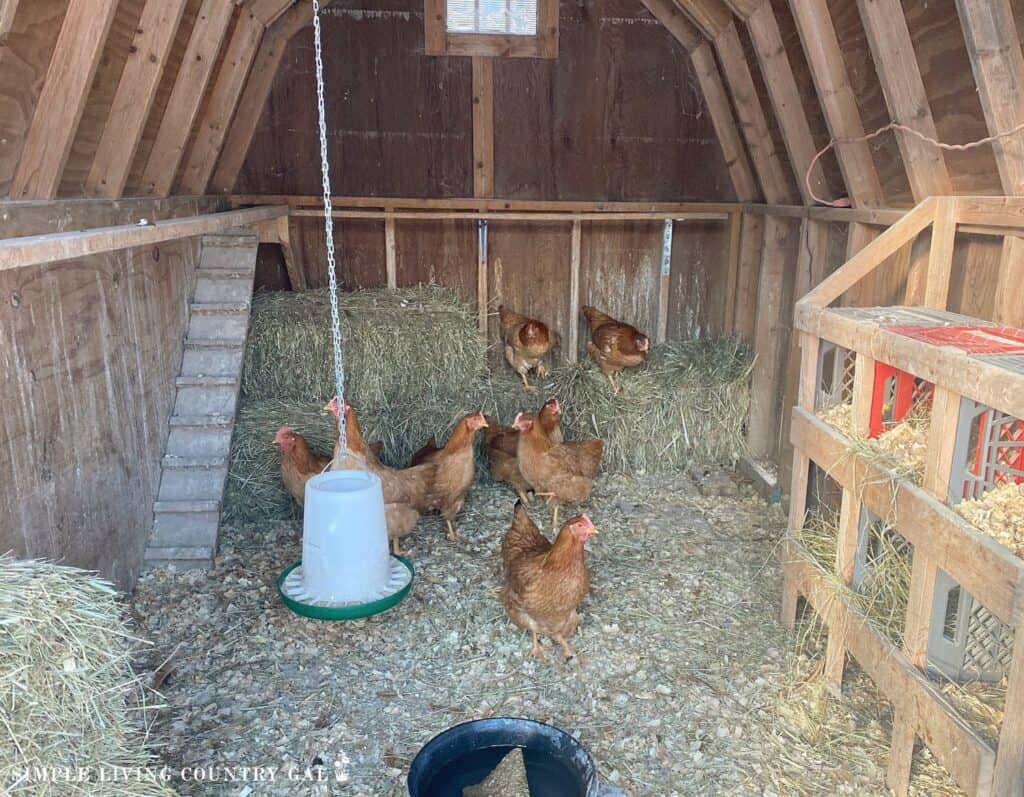
Reason #9. Overcrowding
If your flock is too crowded, it can lead to stress and decreased egg production. Make sure your chickens have enough space to move around comfortably. You want to have four square feet of coop space for each chicken.
How to Help:
- Increase the size of the coop.
- Sell or re-home some of your flock.
Reason #10. Inadequate lighting in the Coop
While natural daylight is important for chickens, artificial lighting can also play a role in their egg production. If your coop doesn’t get enough natural light, consider adding supplemental lighting to help stimulate egg laying.
How to Help
- Hang a light inside the coop to lengthen the days for your chickens.
- If you do not have electricity, invest in a solar option.
Light and Door Tools for the Coop!
DABAOLUM Solar Light Bulbs with Remote Timer, 9W USB Rechargeable Emergency Light Bulb Chicken Coop Light 1800mAh 5 Lighting Modes for Home Shed Hiking Camping Tent Hurricane Power Outage Lamps(Grey)


It’s important to keep in mind that not all chickens will lay eggs consistently. Some breeds are known to be better layers than others, and individual hens within a breed may have varying egg production. It’s also common for hens to take breaks from laying throughout the year, known as molting. During this time, they will shed their old feathers and regrow new ones, which can take a toll on their body and cause a decrease in egg production.
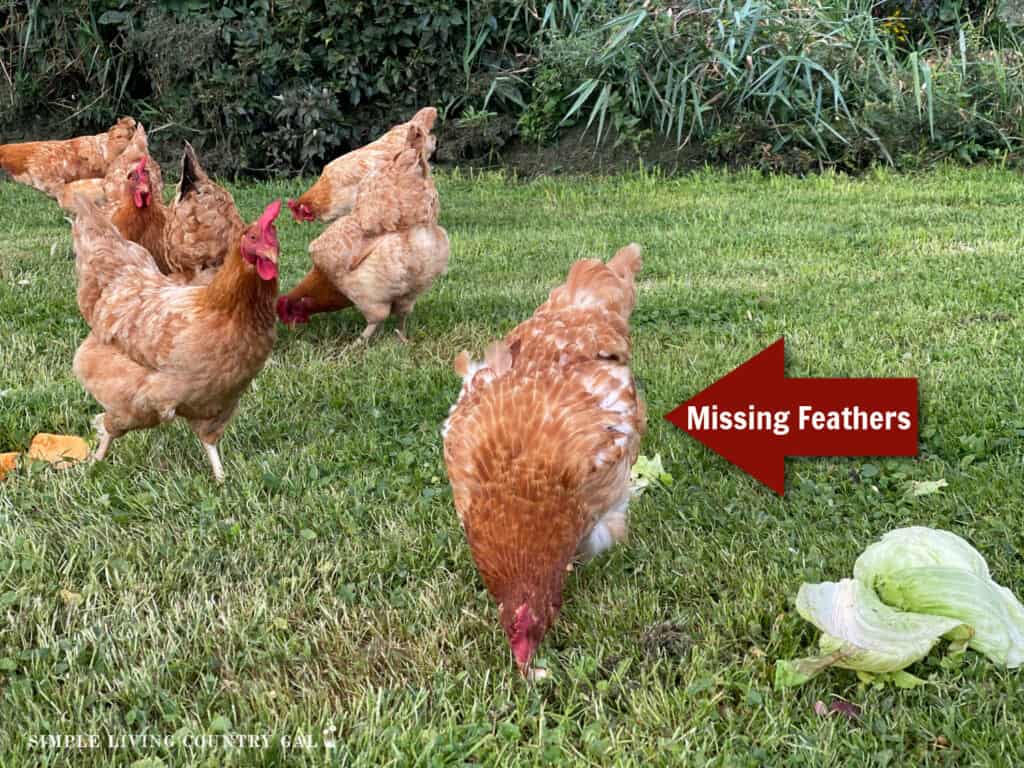
In addition to the reasons mentioned above, proper nutrition also plays a crucial role in a hen’s ability to lay eggs. A well-balanced diet that includes calcium and protein is essential for healthy egg production. It’s recommended to provide access to oyster shells or other calcium supplements for your flock.
Understanding the different reasons that can affect egg production in chickens is important for any backyard chicken owner. By creating a comfortable and stress-free home, providing proper nutrition, and monitoring for any potential issues, you can help ensure that your hens lay eggs consistently and stay healthy.


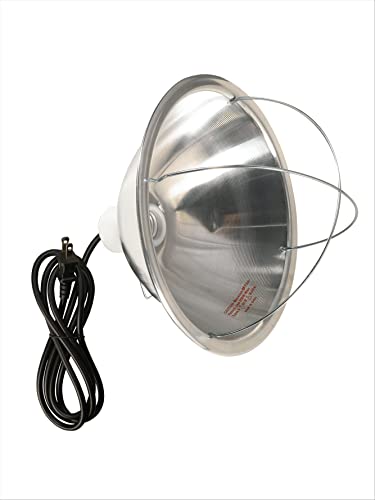
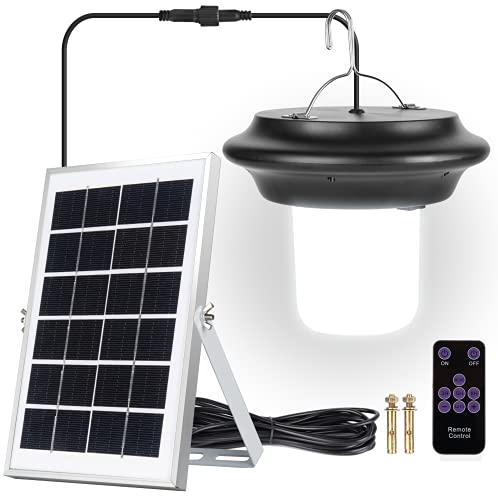

Good info. ! Our “girls” lay so many eggs from spring until halloween, we usually have enough of a supply of eggs preserved, to hold us until the following spring.
If we run out and / or feel the need to kick-start production again, some additional light,
(brooder lamps) usually do the trick. Black oil sunflower seeds don’t hurt either.
We eaten so many, GOOD, home-grown eggs, that, we’d rather preserve OUR eggs than to purchase (yuk), grocery store eggs. Again, (yuk) ! Unhealthy food, produces unhealthy results and begets unhealthy people. Farm Fresh Eggs are BEST !
Great tips! Thank you for sharing!